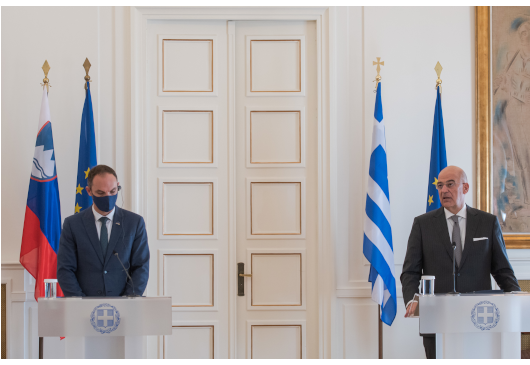 Dear Anže, welcome to Athens. We have met countless times; it is strange however, that it is the first time that we meet here in Athens and I am particularly pleased about that. We had the opportunity to examine, together with the Alternate Minister, Mr. Miltiadis Varvitsiotis, the challenges and opportunities that affect our wider region and to discuss prospects for deepening our bilateral cooperation in economic and defense issues, in the cultural area, and in international organizations.
Dear Anže, welcome to Athens. We have met countless times; it is strange however, that it is the first time that we meet here in Athens and I am particularly pleased about that. We had the opportunity to examine, together with the Alternate Minister, Mr. Miltiadis Varvitsiotis, the challenges and opportunities that affect our wider region and to discuss prospects for deepening our bilateral cooperation in economic and defense issues, in the cultural area, and in international organizations.
We will continue our discussions immediately afterwards, during the working lunch. The main topic of our discussion was, of course, the accession path of the Western Balkans; the effort we are making for their integration into the European family. This has been an ongoing objective of Greek foreign policy since 2003, when we adopted the Thessaloniki Agenda.
We, Greece, being the first country in the Balkans to join the then EEC four decades ago, have a moral duty to offer our assistance to anyone else in the Balkans who aspires to join the common European family.
And of course we look forward to working closely with you, with Slovenia, the first country of the former Yugoslavia to join the European Union; the country which, under the leadership of your government and with your own significant personal contribution, holds the Presidency of the Council of the European Union in a very successful way.
And you have the opportunity in your capacity, my dear Anže, to play a particularly important, catalytic role in the current affairs of the European Union, in the multiple challenges the European Union faces.
We, as Greece, express our particular satisfaction with the results of the European Union-Western Balkans Summit.
We were represented there at the highest level, by Prime Minister Kyriakos Mitsotakis, precisely to demonstrate the enormous importance we attach to it, and to underline the explicit reference to the European Union’s commitment to the enlargement process and the full support for the European perspective of the Western Balkans.
Of course our efforts do not stop here. Greece, being the country that chairs the South-East European Cooperation Process, is hosting a working breakfast on the sidelines of the next Foreign Affairs Council on November 15, to which both European officials and the Foreign Ministers participating in the initiative have been invited.
Moreover, following our joint coordinated efforts, that is, of Greece and Slovenia but also of other countries in the region, we will have a strategic debate on the Western Balkans in the same Council in two weeks’ time.
Unfortunately, however, I have to sound an alarm bell. The European course of the Western Balkans could be reversed. And for this reason we must invest all our efforts as there is always the risk that the Western Balkans will slip back, allow me to say, into their Balkan past.
And it is very important that Slovenia, which currently holds the Presidency of the European Union, is aware of this major challenge.
And as I said yesterday, there are powers also engaged in the Balkans other than European ones, which are making every effort to remove the Western Balkans from Europe by offering so-called development aid, so-called advantages in exchange, military cooperation and even cooperation in the field of education through institutions which preach more in favour of the Muslim Brotherhood and much less for a modern European educational framework.
Today, we also discussed developments in the Mediterranean. Slovenia, together with Croatia, recently became members of the informal group of the already nine Mediterranean countries of the European Union.
And of course that was absolutely appropriate. It was a fulfillment, if you will allow me to say so, of a simple task dictated by geography, as both Croatia and Slovenia are Mediterranean countries.
We also discussed thoroughly developments in the Eastern Mediterranean, the Turkish conduct, the sustained tension, the excessive rhetoric towards both Greece and Cyprus.
I want to reiterate here today what we always say, that Greece does not have any punitive attitude towards Turkey. Greece does not have any punitive attitude towards Turkish society.
On the contrary, Greece seeks a constructive dialogue with Turkey, seeks dialogue with Turkish society, because it believes that a large part of Turkish society still hopes for European integration, still hopes for a different state of affairs in Turkey.
But the European Union needs to send a clear signal that the countries of the region, and especially those that aspire to join the European Union or want to have good relations with the European Union, must respect the fundamental rules of international law, the fundamental rules of the European Acquis.
I would like to thank you again for your presence here today, for the exchange of views that we had and we are going to have, together with the Alternate Minister.
I wish you a successful continuation of the important Slovenian Presidency in the remaining months. Thank you so much, Anže, for your presence here in Athens today.
November 3, 2021


